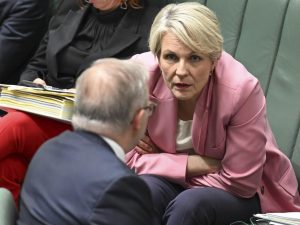
Australia needs a dose of Javier Milei’s Argentine capitalism
As Australia grapples with a stagnant private sector, sticky inflation and declining living standards, it is obvious the economic model of the past 15 years is not working.

As Australia grapples with a stagnant private sector, sticky inflation and declining living standards, it is obvious the economic model of the past 15 years is not working.

If ever an industry needed reform to cut costs for businesses and reduce living costs, it is shipping. Commerce is being crippled by rules Anthony Albanese devised as transport minister in 2012 to prop up the faltering domestic shipping sector.

On the 22nd November, people travelled from all over Australia, to come together in outback Australia to celebrate National Mining and Related Industries Day. The gala event was held at Santos’s Moomba gas field in South Australia.

Imagine a foreign organisation was secretly funding a sophisticated campaign to damage Australia’s economy, divert billions of dollars of investment away from our country, destroy tens of thousands of our blue-collar jobs and bring Australia’s leading position in economic exports to an end.

When Rio Tinto’s board recently met in Montreal, there were half a dozen top officials from the Quebec government as well as senior ministers from Ottawa. the Canadian capital, along for a session.

The Environmental Defenders Office and the consultants they used to prepare the heavily criticised evidence at the centre of their failed legal challenge against oil and gas producer Santos are set to be referred to the National Anti-Corruption Commission.

There was “no person” on Tanya Plibersek’s staff who could tell if the Blayney goldmine could recover from her heritage decision, department documents show, despite later assurances there was “no impediment” to it.

The country’s new free zones plan can foster its rich tech and services potential.

Academic, legal and activist figures in the failed Environmental Defenders Office bid to scuttle a $5.8bn gas field near the Tiwi Islands concocted a rainbow serpent and crocodile man songline map based on guesswork and minimal consultation with Indigenous leaders, according to court documents.

Australia’s richest person Gina Rinehart has taken aim at bureaucrats while calling for Trump-style cuts to the public service, saying taking the axe to public spending would pay for tax cuts.
The billionaire mining magnate and Liberal party donor used her speech at a National Mining Day event hosted by Santos last week to outline her vision of a stripped-back Australian Public Service.

As Australia’s richest person, Gina Rinehart has few qualms about giving out advice to the country’s leaders – and the odd museum curator.